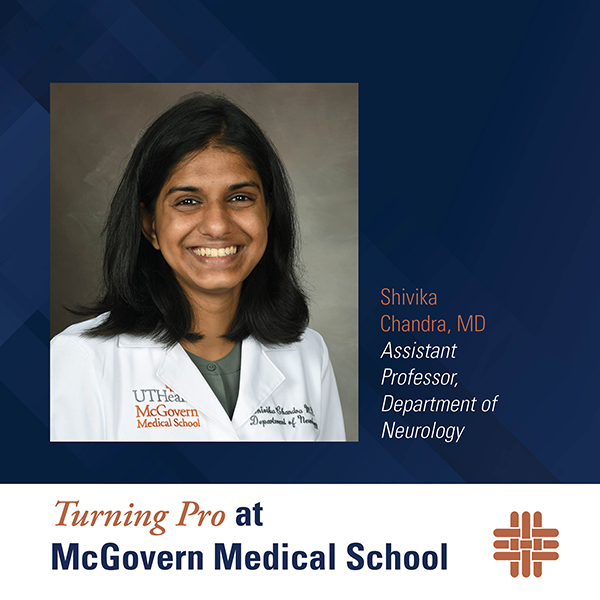Turning Pro at McGovern Medical School: Shivika Chandra, MD

Education toward professionalism is more than being skilled and knowledgeable. It requires a lifelong transformational change in how we think, act, and feel as doctors. This professional formation (Turning Pro) is shaped by the community in which we are surrounded.
The Turning Pro series explores the myriad of ways McGovern Medical School is educating for lifelong transformation change, so we are individually and collectively highly competent, adaptable, committed to values, and guided to having meaningful lives.
In this issue, Shivika Chandra, MD, assistant professor in the Department of Neurology, describes how the Neurology Clerkship uses reflection to guide students in their formation of professional identities.
What is the “Reflection in Neurology” module in the neurology clerkship all about?
In a profession plagued by moral injury and burnout, our endeavor to develop our professional identity, build resilience, and foster a sense of community inspired us to create and integrate the “Reflection in Neurology” module into our educational infrastructure.
This module introduces third-year medical students to the concepts and benefits of critical reflection in medicine and gives them an immersive opportunity to reflect on an experience which resonated with them during their time on the neurology clerkship in both asynchronous (written reflections on Canvas) and synchronous (small group session) formats.
The hourlong synchronous sessions are facilitated by faculty members from diverse background including neurology, (Kendra Anderson, PhD; Shivika Chandra, MD; Melissa Christie, MD; Erin Furr-Stimming, MD; and Amanda Jagolino-Cole, MD); neurocritical care (Swathi Kondapalli, MD); and the McGovern Center for Humanities and Ethics (Rebecca Lunstroth, JD).
Prior to COVID-19, the small group sessions were held in person at the medical school. Since the pandemic, we have pivoted and now host the sessions virtually.
How are we making transformational change possible to help students Turn Pro?
The opportunity to practices guided reflection has been rewarding to students and facilitators alike. From open dialogue about vulnerability as physicians to processing difficult interactions, appreciating our identity as healers, exploring the humanistic facets of healthcare and healing, and identifying sources of burnout – the depth and breadth of these conversations transcend the boundaries of patient care.
The need for such opportunities for mindful reflection ins beautifully articulated in the words of Morgan Blaker, MS3.
“There were many other experiences throughout my non-traditional years that warranted conversations like this, and many post-shift happy hours. But one thing I did not fully appreciate until starting MS3 was just how important it is to have a community around you that is open and willing to communicate about many of the things we encounter as healthcare workers.
“Throughout our clinical years in medical school, we are often siloed and apart from our colleagues as we move, ships passing in the night, from clerkship to clerkship. I have felt the absence of that space and seen firsthand how it has affected students in real-time. So, when I finally landed in the neurology clerkship, and got to participate in small-group reflections, I was reminded of how much we can benefit from coming together to share our experiences. A small spark lit a mound of kindling I had been gathering for quite some time.”
What are the next steps for these reflection sessions?
Our hope is to continue to expand on the opportunities for guided reflection interspersed throughout the curriculum and use these discussions to empower learners to develop their own toolbox for self-care. During one of the small group discussions recently, MS3 students Morgan Blaker and Brittny Bell brainstormed how to take this movement forward and are in the process of creating a student-led group focusing on reflection in medicine, which is open to all medical students.